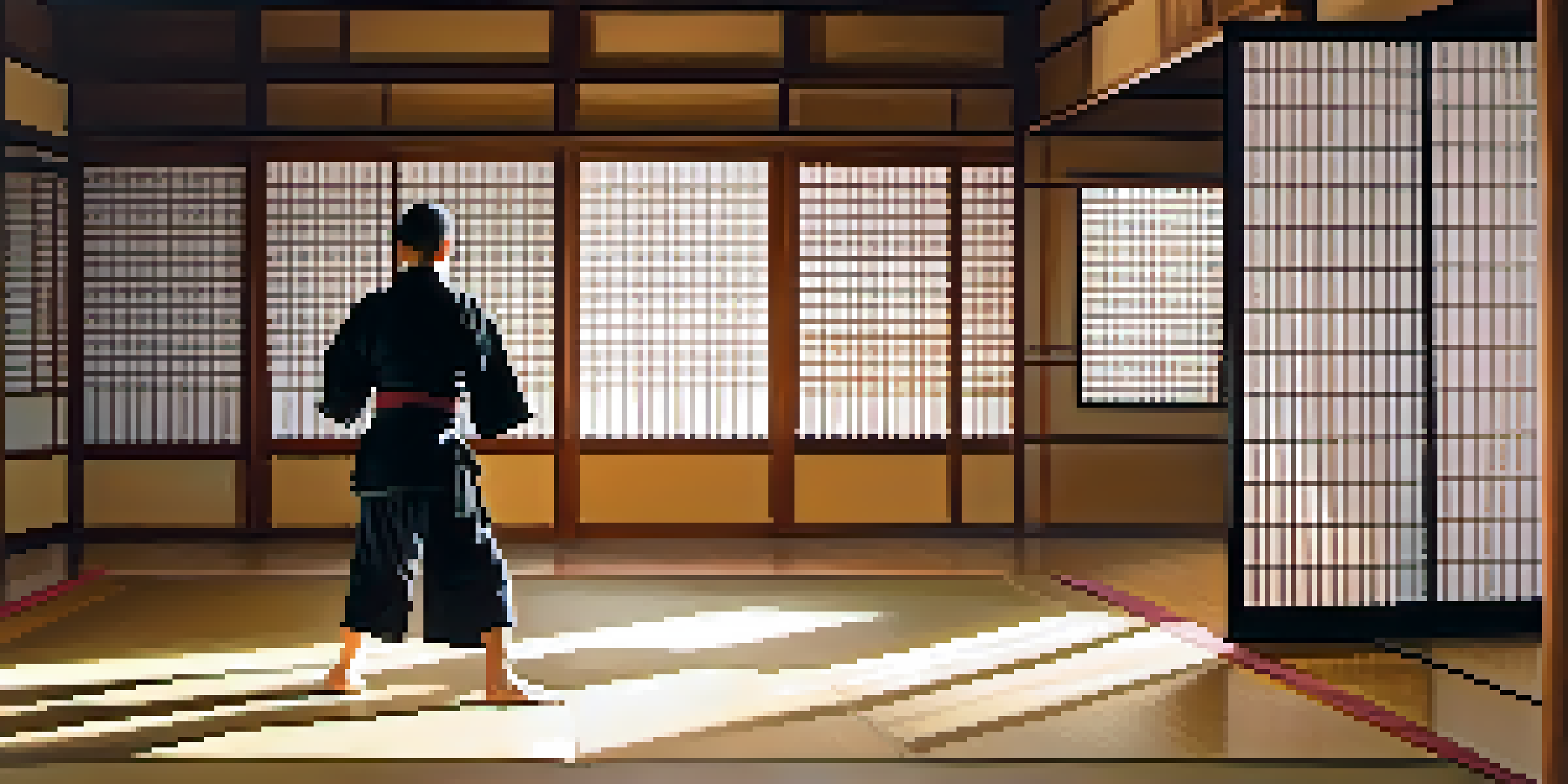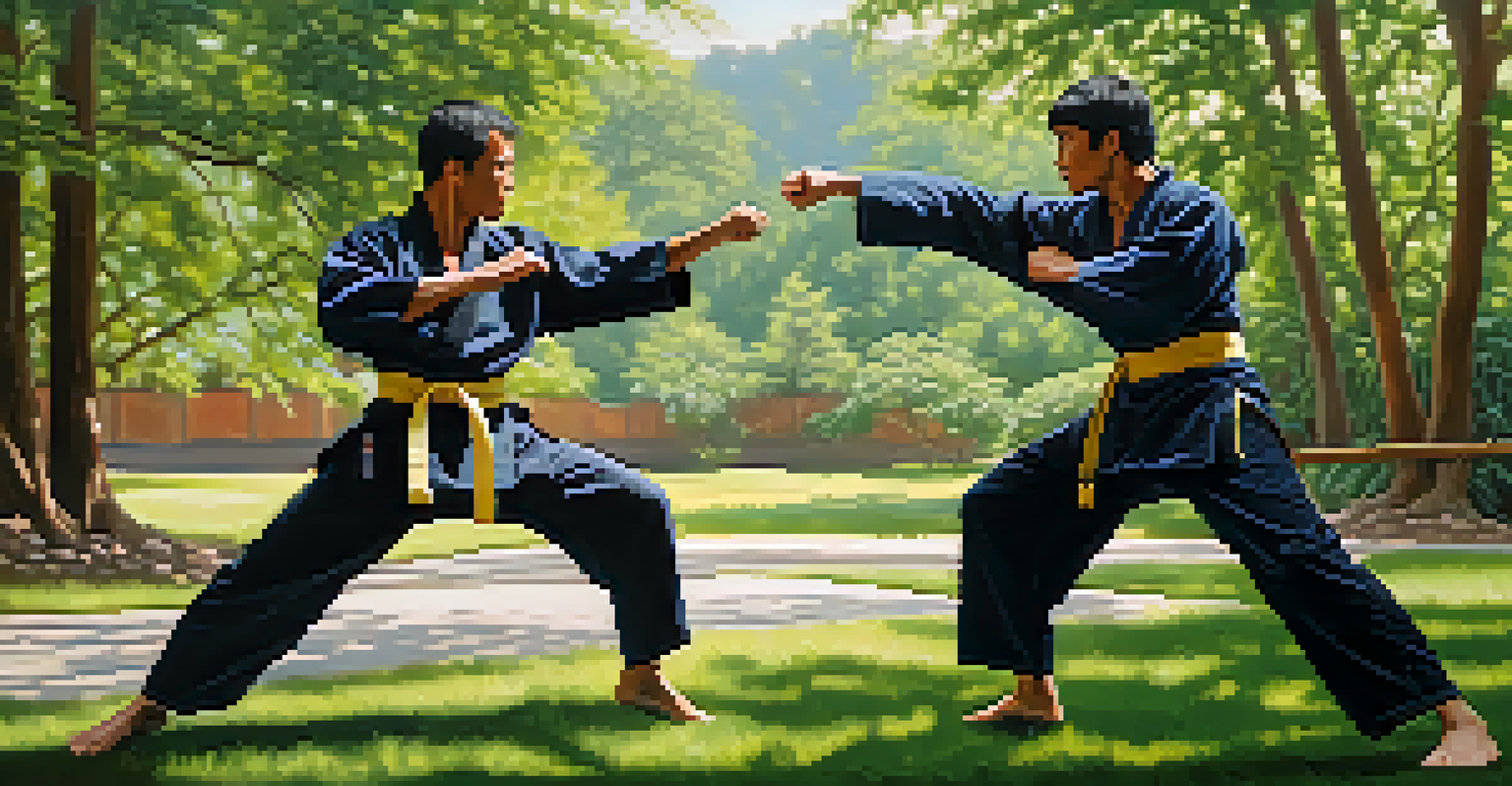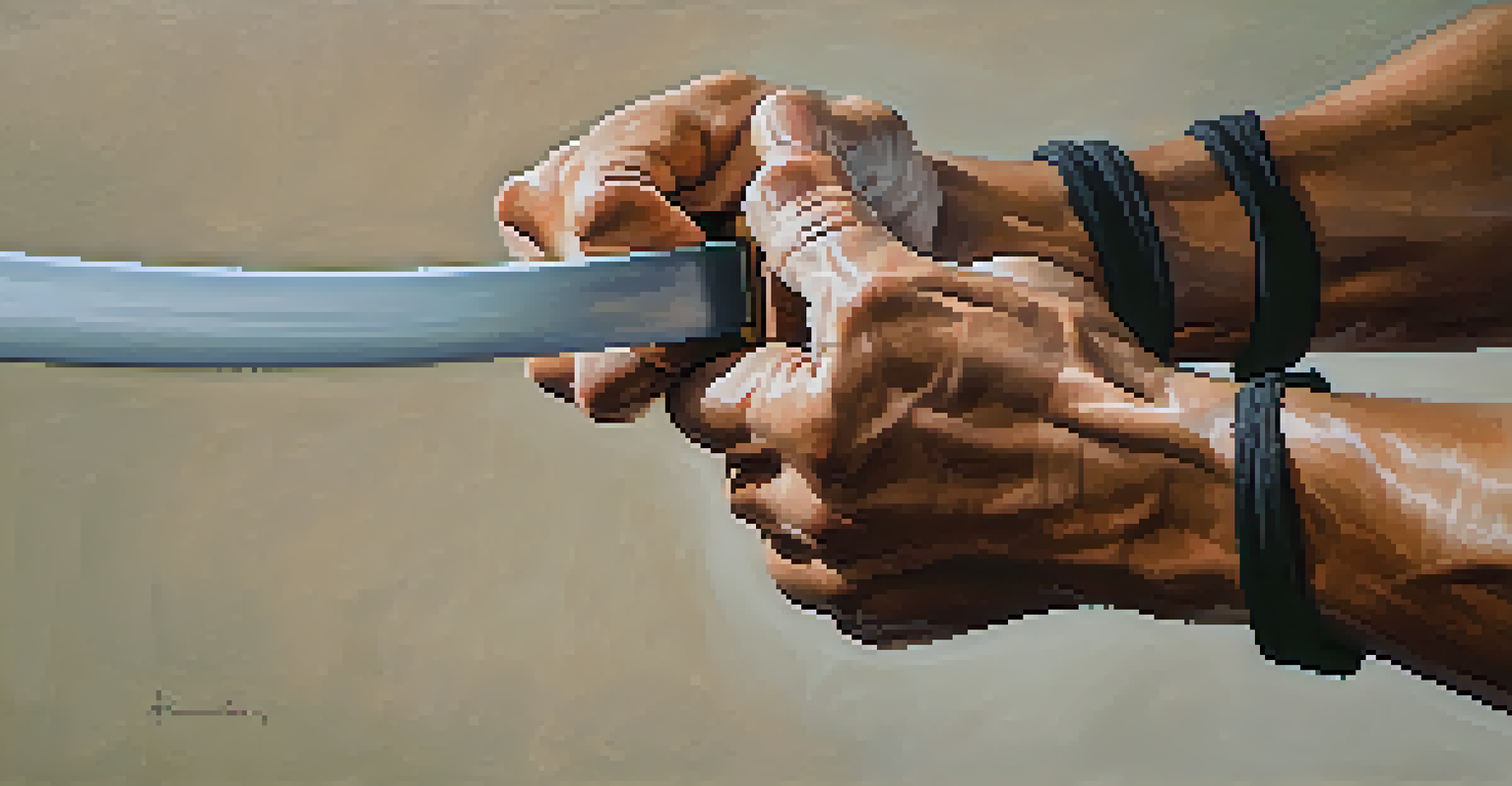The Importance of Intent in Martial Arts Movements

What is Intent in Martial Arts?
In martial arts, intent refers to the purpose or goal behind each movement. It's not just about executing techniques; it's about understanding why you are performing them. When you approach your practice with intent, each action becomes more meaningful and focused, enhancing both your performance and your learning.
The mind is everything. What you think you become.
Intent can transform a simple punch or kick into a powerful statement of purpose. For instance, when you throw a punch with the intention of striking your opponent, it becomes more than just a physical action. It embodies your strategy, your mindset, and your emotional state, all of which contribute to the effectiveness of the technique.
Moreover, cultivating intent allows martial artists to connect their movements with their mental state. This connection can be likened to an artist pouring their emotion into a painting; the result is far more impactful when driven by a clear intent.
The Connection Between Intent and Focus
Intent is closely linked to focus in martial arts. When you practice with a clear intention, you're more likely to concentrate on your movements and the surrounding environment. This heightened focus not only improves your technique but also enhances your ability to read your opponent's actions.

For example, during sparring, a fighter who understands their intent can better anticipate their opponent's moves. With a focused mindset, they can adapt their strategies in real-time, making them more effective in a dynamic situation. This adaptability is crucial in martial arts, where unpredictability is the norm.
Understanding Intent Enhances Practice
Approaching martial arts with clear intent makes each movement more meaningful and focused, improving performance and learning.
In essence, enhancing your focus through intent allows you to remain present in the moment, resulting in more precise and calculated movements. The clearer your intent, the sharper your focus becomes, creating a powerful synergy in your practice.
Intent and Mind-Body Connection
The mind-body connection is a fundamental aspect of martial arts, and intent plays a pivotal role in strengthening this bond. When a martial artist is aware of their intentions, they can synchronize their mental and physical actions more effectively. This harmony leads to smoother and more efficient movements.
In the midst of movement and chaos, keep stillness inside of you.
Consider a martial artist performing a kata, a series of pre-arranged movements. When they execute each technique with intent, they not only perform the movements but also embody the spirit of the kata. This connection between mind and body enhances their performance, making it more fluid and powerful.
By fostering a strong mind-body connection through intent, martial artists can tap into their full potential. This synergy allows for greater control, balance, and precision, ultimately leading to improved performance in both training and competition.
The Role of Intent in Self-Defense
In self-defense situations, the importance of intent becomes even more pronounced. Understanding your intention can dictate how you respond to an immediate threat. If your intent is to protect yourself or others, your movements will be sharper and more decisive.
For instance, if faced with an aggressor, a martial artist with clear intent will react instinctively and effectively. They won't hesitate or second-guess their actions, as their purpose drives their response, allowing for a quicker and more efficient defense.
Intent Boosts Focus and Adaptability
A strong sense of intent enhances concentration, allowing martial artists to read opponents better and adapt strategies during sparring.
Moreover, practicing self-defense with intent builds confidence. Knowing your purpose in a potentially dangerous situation empowers you, transforming fear into focused action. This mental readiness can make all the difference in how you handle real-life confrontations.
Intent in Training and Skill Development
When training in martial arts, having a clear intent can significantly impact skill development. Rather than mindlessly repeating techniques, practitioners who train with purpose are more likely to internalize their movements. This deep understanding leads to mastery over time.
For example, during drills, a student focused on their intent can evaluate their performance critically. They can ask themselves questions like, 'What do I want to achieve with this movement?' or 'How can I adjust my technique to better align with my goals?' This self-reflection fosters continuous improvement.
Intentional training also encourages martial artists to set specific goals. Whether it's developing speed, power, or precision, having a clear intention guides the training process, making each session more productive and rewarding.
How to Cultivate Intent in Practice
Cultivating intent in martial arts practice requires mindfulness and self-awareness. Start by setting clear goals for each training session, whether they are technical, physical, or mental. This clarity will help you focus your energy and efforts effectively.
Additionally, consider incorporating visualization techniques. Before executing a technique, take a moment to visualize your intent and the desired outcome. This practice not only reinforces your goals but also prepares your mind and body for the movement ahead.
Intent Shapes Self-Defense Responses
In self-defense situations, a clear intent drives quicker and more decisive reactions, empowering martial artists to handle threats effectively.
Finally, engage in regular self-reflection after your training sessions. Ask yourself how well you embodied your intent and what you can improve next time. This ongoing process will help you deepen your understanding of intent and its importance in your martial arts journey.
The Impact of Intent on Performance and Competition
Intent plays a crucial role in enhancing performance, especially in competitive settings. A martial artist who competes with clear intent is more likely to deliver their techniques effectively. This clarity not only allows for better execution but also instills a sense of confidence and composure.
Consider a competitor entering a match with a solid game plan. Their intent shapes their strategy, guiding their movements and decisions throughout the bout. This approach leads to a more focused and determined performance, increasing their chances of success.

Moreover, competitors who harness the power of intent can adapt to changing circumstances during a match. By remaining aware of their purpose, they can pivot their strategies, respond to their opponent's actions, and ultimately maintain control over the flow of the fight.
Conclusion: The Lasting Importance of Intent
In conclusion, intent is a fundamental component of martial arts that transcends mere physical movements. It shapes how practitioners approach their training, self-defense, and competition. By embracing and cultivating intent, martial artists can enhance their effectiveness and achieve greater mastery over their craft.
As you continue your journey in martial arts, remember that each movement carries the potential for deeper meaning. When you practice with intent, you not only improve your technique but also enrich your overall experience, making each session a step closer to mastery.
Ultimately, the importance of intent in martial arts lies in its ability to transform your practice. It encourages a holistic approach, integrating mind, body, and spirit, which is essential for any martial artist seeking to elevate their skills and understanding.